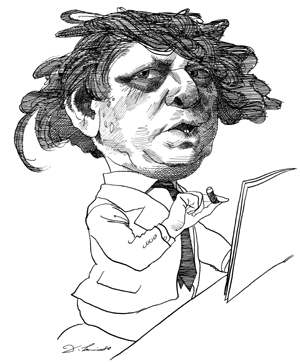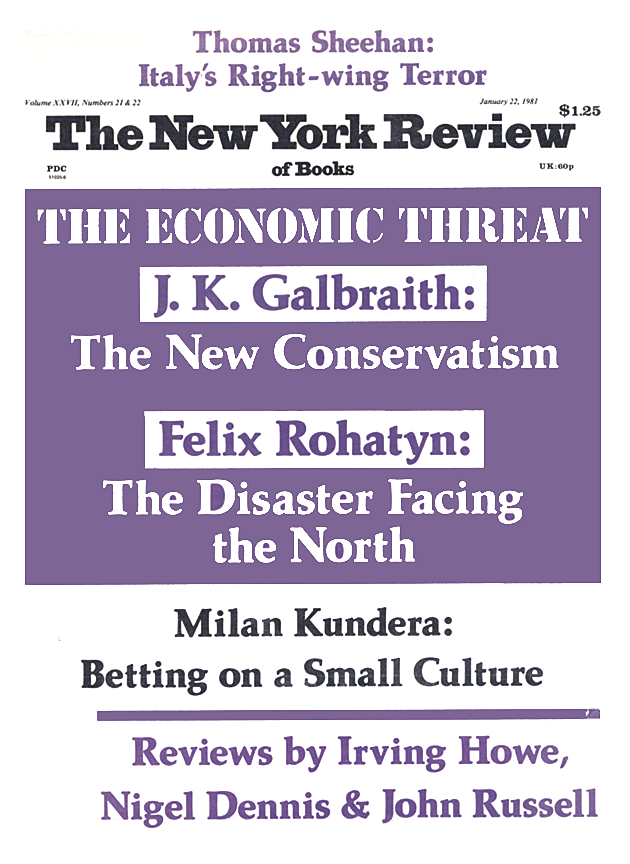This is a most difficult novel to review, not because it is a quarter of a million words long and a good deal shorter in quality, but because it is confusing in its intentions. It begins, for instance, with the narrator, an ancient queer named Toomey, getting kicked in the teeth by his so-called “secretary,” and the next 100-odd pages see him working his way through three other boyfriends at different stages of his life—language extremely coarse, no holds barred. Not unnaturally—odd as that phrase may seem in such a context—we get the impression that we are reading a grim study of the gay life, and this opinion is supported by various bits of evidence: 1) the word fuck is present on page after page, but there is a complete absence of cunt; 2) tits do appear and even a clitoris, but the former are falsies of a sort and the latter a ghastly blunder (wrong bed, when stoned); 3) only the men are allowed to be naked; 4) all sexual intimacies, including assaults in bars by sailors, exclude the female.
Exceptions emerge as we read on, but are they really exceptions? The principal character in the book is male but not gay: unfortunately, he is a priest who eventually becomes Pope Gregory XVII, so he is not allowed to play the organ. Toomey’s sister—a fine girl, though always in her clothes—makes a promising heterosexual start but soon goes over to the lizzies. Her husband, a flashy composer who is by far the best-drawn character in the whole novel, goes to Hollywood and marries five more women—which, God knows, should strike a heterosexual chord. But Mr. Burgess has doomed him to be sexually sterile, so his six marriages are nothing but the neurosis of a frantic eunuch. Finally, a couldn’t-be-more-normal husband and wife show up, both well equipped physically with everything two four-letter words could describe, and Mr. Burgess encourages us to hope that there is a future for the race in this young pair. But this only shows how little we know about Mr. Burgess. The newlyweds go off to darkest Africa to do useful social work, and have strips cut off them (only their heads can be shown in the morgue) by enthusiastic black converts to Christianity (real flesh, real blood, yum-yum, plenty-good Christian eucharist).
Obviously Mr. Burgess must have his reasons for being so determined to discontinue the human race. Dame Rebecca West, referring to the novel the other day, said that it was about “the origin of evil,” but apart from certain theological passages in which the old story is trotted out (i.e., God is perfection and could not create evil, but in his goodness he gave us free will, which we used to create evil ourselves), it seems equally likely that the struggle between evil and muscular Christianity is what the book’s about, with God choosing, in the mysterious way he has, a good many unlikely champions.
All such “deep” parts of the novel—which are not really very deep but are certainly extremely spacious—will be overlooked or skipped by most readers, who will enjoy being horrified by the obscene situations, the appalling cruelties, and the coarsely comical passages which show Mr. Burgess at his masculine best. The shape of the novel, which is perfectly circular, will also please those who like a story to begin at the end and end at the beginning—age recalling youth and youth growing into age.
We find the narrator at first where we find him almost at last—in the house in Malta in which Mr. Burgess himself lived for a few years some quarter of a million words ago. Toomey is a shameless caricature of poor Somerset Maugham in his last years, with a lifelong string of second-rate works behind him and his sadistic “secretary” in bed with him. That “Maugham,” as the ages go by, should have spells of being P.G. Wodehouse as well is a tribute to Mr. Burgess’s real power as a cartoonist.
More important to the novel is the fact that the Roman Church is in pursuit of Toomey, who was the only witness to a miracle performed in Chicago by his sister’s brother-in-law, the late Gregory XVII who is now in process of being sanctified. Here the reminiscences begin, starting with the narrator’s childhood in Ireland and his seduction at fourteen by “A.E.” (George Russell)—a fact disputed by “Jim” Joyce on the grounds that Russell’s sexual preference was for pigs.
This, in small, represents Mr. Burgess’s method throughout his book. Some of his numerous characters are, or were, living people; some are his pure inventions; some—many more than one realizes, no doubt—are his impure combinations of invention and reality. They are all let loose against backgrounds that move in time from World War I to the present day, and move in space to every corner of the inhabited world. A few, such as the admirable Bishop of Gibraltar, have the Waugh-like habit of appearing anywhere at any time; as to the rest, their excuse for being present is simply the narrator’s presence at the same moment. In short, the method of the historical novel, but carried to the picaresque extreme and taken seriously one moment and guyed the next.
Advertisement
Mr. Burgess is undoubtedly serious about religion, and the nearest thing to a theme in his novel is the slow but steady growth of the ecumenical ideal in the Churches of the world. What this united Church will have to grapple with is shown in the equally serious descriptions of worldwide evil in all its most monstrous forms. An incessant slaughter of the innocents reaches its peak in the two world wars but keeps going nicely at community level in such horrors as the Chicago Mafia during Prohibition, the Nazi extermination of the Jews, the use of the evil eye in the Far East, the wholesale suicide of worshippers in the recent California case.
Mr. Burgess doesn’t have far to look for his examples; they are the world in which we live, the world which he is determined to make us see and feel as never before. His ecumenical champion, whom we see rising through the years from priest to pope, is built on the same tremendous scale as the evils themselves—a massive, gluttonous figure, hungry for battle and ready to wade in, if necessary, swinging an outsize pocket crucifix and summoning evil out of the mouth of the wrongdoer in ribbons of stinking ectoplasm. His election as pope is one of God’s well-timed mysteries (the favored cardinal drops dead at the winning-post) and Gregory XVII is free to sweep the Church into the modern world, “kissing the feet of the poor, weeping with earthquake widows…embracing criminals and Communist leaders,…pleading inviolate the rights of man against corrupt and tyrannical regimes”—all the hot stuff we all approve of, in fact.
Mr. Burgess’s problem has been to accommodate his material. The changing backgrounds of eighty years he manages very well, drawing on snatches of period songs and describing women’s fashions with remarkable completeness (what male novelist has ever told us what is on a woman except a man?). He fits in the global travels very well too: with Toomey/Maugham getting richer and more famous every day, what more natural than that he should be searching the world for new subjects? Or meeting those old favorites of the avenging novelist—the moguls of Hollywood? Or sitting around in Paris cafés with “Jim” Joyce, chatting with Hemingway, glimpsing Alice B. Toklas?
But these are simply the physical accommodations, which, God knows, a quarter of a million words should be able to board and lodge. It is the many aspects of Mr. Burgess’s mentality that present the real problem: how to make the light shake down with the heavy, the pious with the scabrous, the tough with the tender?
The reason that they can’t and don’t is that brute force is really the only prime mover with which Mr. Burgess is at home. His approach to his subjects and his readers is brutishly dictatorial: the neatness and cleverness with which he handles words and constructs sentences would be pretty to see if an infinitely boorish spirit were not to be felt behind them. All’s well when it’s a randy baronet buggering an able-bodied seaman on a quay, or a future pope of the Burgess persuasion tucking into a load of soup. But should such a talent for indelicacies be allowed to handle more sensitive material? Can it be trusted to know when it is engaged in nonsense or wordy sentimentality?
Mr. Burgess has no conception of any such requirements. The obverse of his toughness is mawkishness (as it usually was with Hemingway) and of his crudeness, a show of intellect. He sees nothing ludicrous in making Gorgonzola, which is a pleasant town in northern Italy but a farcical place when it is put into fiction, the home of a future Pope’s foster-mother, giving her an agonizing terminal cancer of the rectum, converting her to Judaism, and sending her into Nazi Germany to fire a pistol at Heinrich Himmler—and all with the solemnity of a novelist who believes himself to be an honest artist. He finds nothing phony in a dungeon scene where the aforesaid pope-to-be must watch a little girl being tortured with a dentist’s drill by an SS man in hope of making him betray the local Resistance leaders—and nothing sanctimonious about the outcome: the child’s forgiveness of the torturer, the torturer’s conversion to a holier way of life.
Advertisement
Of his limitations as a novelist, Burgess lives in perfect ignorance: it is plain to see that his forte is the short, scabrous incident and, above all, mimicry and the comic aspects of conversation; but pomposity drives him into long dissertations which he seems to defy the reader to dismiss as worthless. Defiance, in fact, is a key element in his writing—an incessant digging into hurtful places and the implied threat that any rejection of it will be the responsibility of the reader who wants to escape reality.
But this is precisely what the reader must stand up to. The boorishness of Mr. Burgess is not a revelation of reality; it is not even the everyday realism that Oscar Wilde described as the sweepings of third-class railway carriages. It is simply a consistent use of the diabolism that the novel pretends to expose, and to accept it as something better is to surrender to the method in a most ignoble way. The reader who finds himself dismayed and distressed by Mr. Burgess may take heart from the fact; it proves that there is still some good in him and that the times have not robbed him completely of his sensitivity.
This Issue
January 22, 1981



